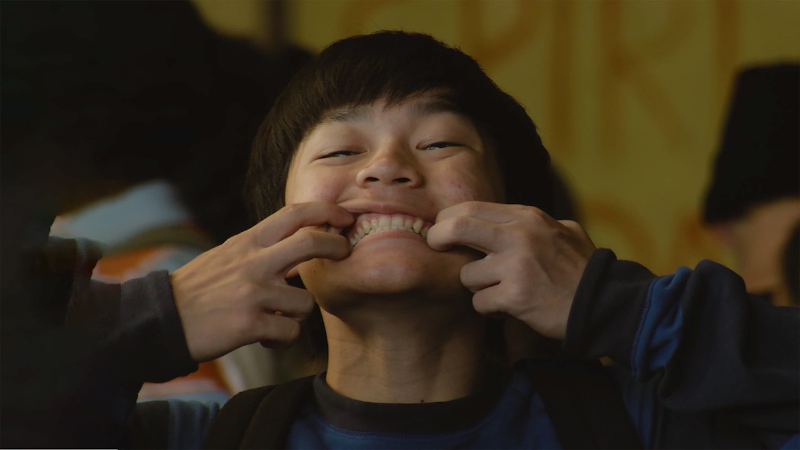Director – Sean Wang – 2023 – US – Cert. 15 – 94m
*****
A young, Taiwanese-American teenager must deal with issues of ethnicity, family and love in 2008, when social media has become a significant element of growing up – out in UK cinemas on Friday, August 2nd
2008. California. Summer. 13-year-old Taiwanese-American Chris (Izaac Wang), who prefers to go by the nickname Wang Wang, is rebelling. Mandarin is spoken at home by Nai Nai (‘grandma’; Chang Li Hua) and mum (Joan Chen), but that doesn’t stop mega-sweary English language shouting contests at the supper table between Wang Wang and elder sister Vivian (Shirley Chen) who is due to attend UCSD later in the year. When she’s out, Wang Wang hangs out in her room and posts as her on her Facebook (about which, amazingly, she never comes back to him). In the bathroom, he pees into her moisturising cream (leading to her threatening to period him in the mouth if he ever does it again).
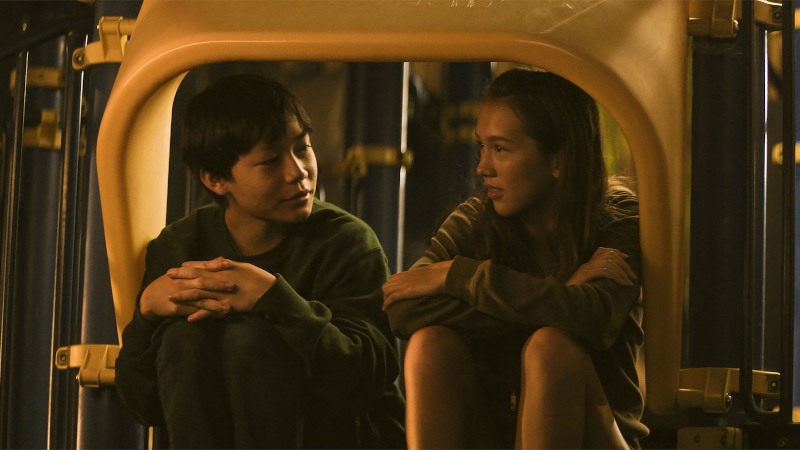
Outside the house, he hangs out with his peers Farhad Mahmood (Raul DIal) and Jimmy Kim aka SOUP (Aaron Chang). Egged on by them in the manner of pubescents everywhere, he attempts to hang out with Madi (Mahaela Park), the girl he fancies. He doesn’t really know how to behave and makes the most appalling social gaffes in all this. Fearing he’s lost his closest friends, and feeling rejected, he chances upon three older skateboarders Donovan (Chiron Cillia Denk), Corey (Sunil Maurillo) and Nugget (Montay Boseman) in need of someone to video their skateboarding moves since their filmer just quit. Wang Wang presents himself as fitting the bill to get the gig, then sets about teaching himself the required skill set from the internet.
However, these boys are a little older than he is, and when you’re a teenage boy, that age difference can be a huge deal. He attends a party with them where he consumes too much alcohol and has to be helped to throw up by his elder sister in the bathroom at home without mum or Nai Nai finding out. With the first day of high school looming, he finds himself wondering if he can get back together with his peers, despite everything that has occurred between them.
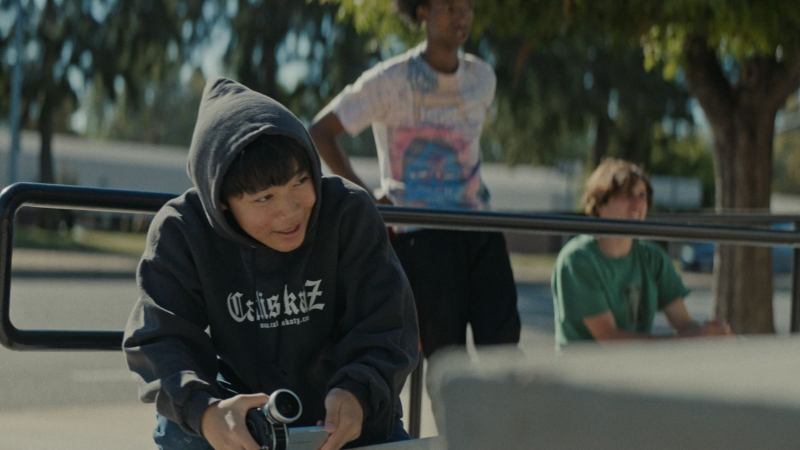
Life in the last hundred years or so has undergone change at an ever-accelerating pace, and the experience of growing up has changed radically. This is probably even more true of the last two decades with the rise of social media and the smartphone. This coming-of-age tale is set in 2008, so it’s in the early days of Facebook, but before the rise of the smartphone, Twitter and much else. For any child, these are unprecedented times, even before issues of ethnicity come into play.
In Chris’ case it’s further complicated by his dual ethnic identity. His Nai Nai and stay-at-home amateur painter mum are locked into Chinese culture and, with his dad back in Taiwan as the family’s breadwinner, unseen in the course of the narrative, only his big sister really has any idea of what Chris is going through (although being five years older, she will have witnessed the appearance and development of Facebook rather than just stumbled upon it ready to use, as he will have done). Their sibling rivalry is intense, especially given they fall on either side of the gender divide, although in the end, his elder sister is there for him – even if she will soon be away at college and therefore not around to support him.
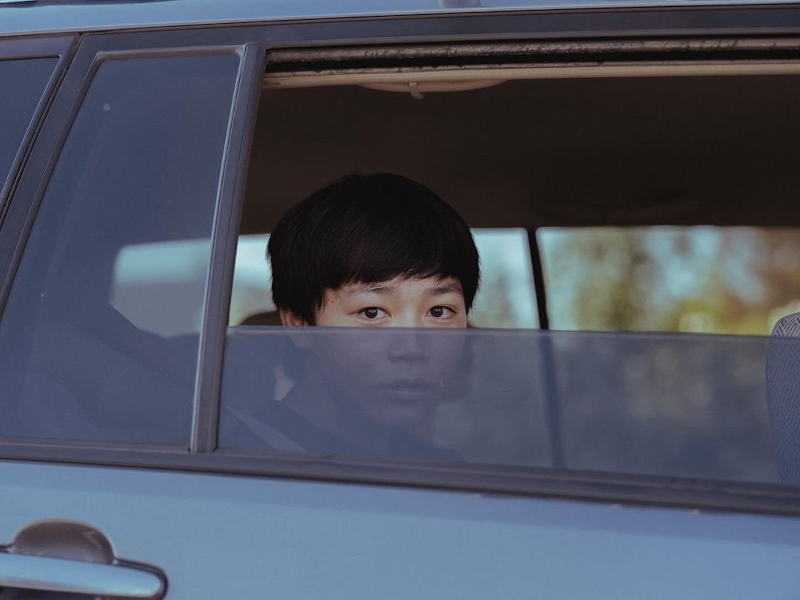
Dìdi is the Mandarin word for little brother, and used as a term of affection by Chinese parents for younger sons. Like Taiwanese-American writer-director Sean Wang in his real life childhood, Chris is the Dìdi of his family. Director Wang likewise grew up in California. Nai Nai is played by Wang’s real life grandmother, the paintings that Chris mum has painted in the film were painted by Sean’s real life mum Cynthia Lee, and the location used for his bedroom is the real life bedroom from Sean’s childhood. So those elements of the film are autobiographical. As an affectionate tribute to his family and upbringing; it could almost be said to contain distant echoes of a home movie.
Yet, it’s very much a compelling exercise in storytelling, cleverly constructed and shrewdly cast. Izaac Wang, whose performance more than any other here has to carry the film, captures the contradictory range of emotions of a deeply insecure teenage character who can be vindictive and unpleasant one minute and friendly and caring the next. Sean Wang seems blessed with an ability to write the sort of complex, contradictory characters of all ages likely to have professional actors queueing round the block to play them, and it’s no surprise to find someone of the calibre of Joan Chen here. She’s as good in this bit part as in anything she’s done, which is saying a lot, but then she has very good material to work with. Many of the less established names playing other bit part roles are extraordinarily impressive, too.
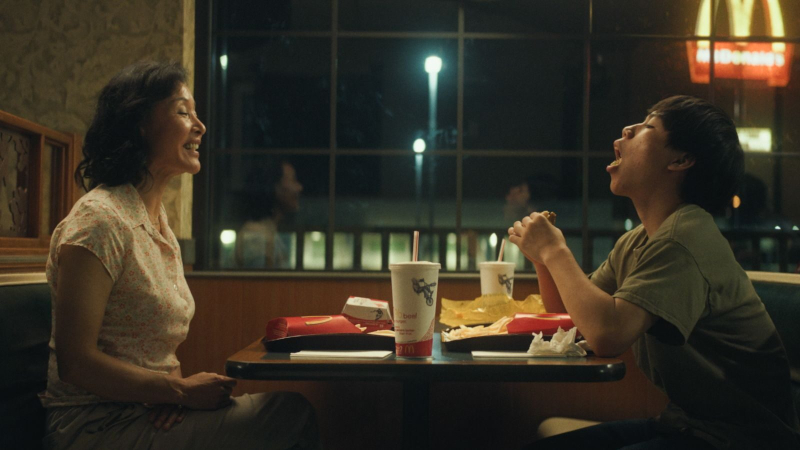
Although very effective, picture composition and editing seem to defy any established cinematic logic, perhaps the result of someone who has grown up alongside the rise of the smartphone. Even though this is essentially a drama, there’s an unexpectedly immersive feel to it: you really feel like you’re sitting at the dinner table, filming skateboarders, looking at a computer screen or being coaxed to puke in the bathroom sink.
One or two lines jokingly refer to the teenage Wang, after he’s been filming skateboarders, as the next Ang Lee. Director Ang Lee is the movies’ great Taiwanese-American success story, whose first three features, like Wang’s DÌDI, are ethnically-based dramas containing highly personal elements. One single feature is not enough to make such a judgement, but keeping that limitation in mind, it’s possible that Sean Wang might turn out, in a few more films’ time, to be a comparable talent to Ang Lee.
Putting that thought on the back burner for now, DÌDI is a terrific and strikingly bold coming-of-age story, breathtakingly fresh in its telling, perfectly cast and superbly performed. A gem, well worth 94 minutes of your time.
DÌDI is out in cinemas in the UK on Friday, August 2nd.
Trailer:
